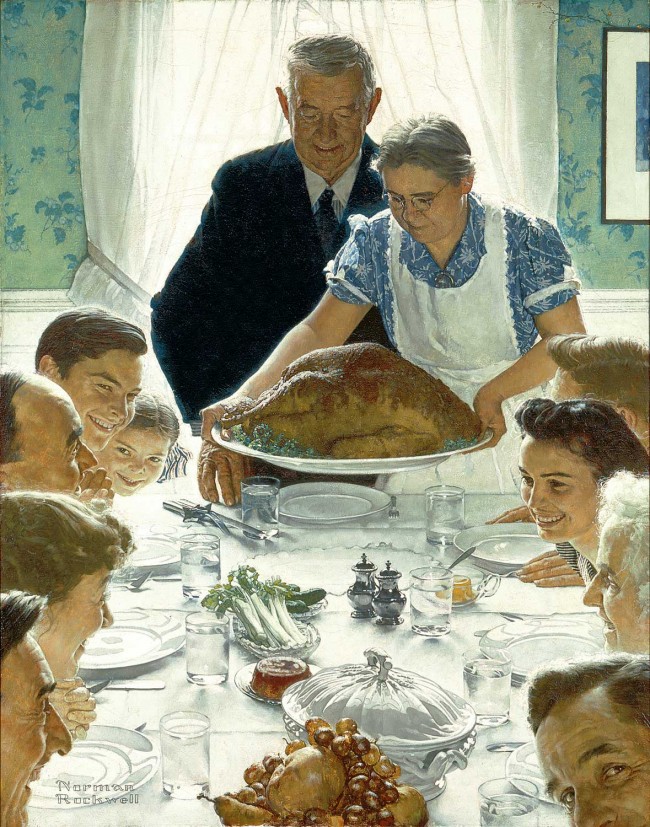The Family Farmers Who Make Possible Our Thanksgiving Dinners
Whether you enjoy turkey, pheasant, or ham; pumpkin or apple pie; or infinite amounts of mashed potatoes drenched in sweet cream butter — every Thanksgiving table depends on the small farms and businesses where owners and laborers put in ungodly hours to make sure family traditions can persist year…

LEECHBURG, Pennsylvania — Tom McIlwain is sitting just outside the double doors leading to the country store at Pounds Farm, shaking off the chill and warming up with a cup of hot coffee. The 91-year-old has just finished herding the last batch of live turkeys, gathering them onto a large trailer to go to the processing center for this year’s Thanksgiving season.
The Apollo native calculates he’s been chasing some kind of farm animal for most of his life. Despite retiring 15 years ago, he is still herding turkey, saying he is proud his efforts are an integral part of putting the main dish on family tables all over western Pennsylvania this Thursday.
“I decided to keep working to help good friends out,” he says, then looks toward one of two brothers who own the farm, Rick Pounds. “But also I like being part of a farm family. There is a lot of hard work and long hours that goes into maintaining the health of the turkey; that I am part of making sure that is the case and families all over the area are enjoying them is very meaningful.”
Rick Pounds, 66, estimates they’ll place more than 4,200 turkeys on tables this year. “That is down from last year in part because of lack of help, but also a smaller flock this year, increased feed costs, and age,” he says. “I am getting old,” he adds, smiling.

Whether you enjoy turkey, pheasant, or ham; pumpkin or apple pie; or infinite amounts of mashed potatoes drenched in sweet cream butter — every Thanksgiving table depends on the small farms and businesses where owners and laborers put in ungodly hours to make sure family traditions can continue year after year.
“We understand that the turkey on your table is more than a turkey, that it is preserving that recipe that your great-grandmother or grandmother had that makes the turkey taste just right. It’s also the people who are sitting at the table with you, so we put as much love and care in raising our turkey, knowing that it has more meaning that just the meal,” Beverly Pounds said. She is the wife of Tim Pounds, who along with his brother has continued their family’s own farming tradition, which began with their father in 1945.
Ninety-seven percent of farms in America are family owned. Without families like the Pounds, not just Thanksgiving but everyday eating wouldn’t be the same. Much of the food in your grocery store display cases comes from farms and small businesses within an hour of the city’s limits.
In interviews with the Pounds family, who run their farm at the far northern corner of Westmoreland County; the Stahl family, who run their potato farm at Somerset County; and the Serrao family at Plum Borough, who own and run Oakmont Bakery, the most striking similarity is that their alarm clocks all go off around 2:45 a.m.
The other common denominator is how inflation has impacted everything they do, from the cost of fuel for their vehicles and machinery to the skyrocketing water and electricity bills and the prohibitive costs of buying new machinery.
Kermit and Gladys Stahl’s potato farm just off state Route 31 is legendary for its tasty fresh potatoes. Mr. Stahl explains there is a lot of love and labor that goes into that potato on your plate any day of the week, let alone on Thanksgiving. Standing inside an old barn he converted into a general store of sorts, he says it all begins when he buys his seeds.
“I usually purchase certified seed from a broker which comes in 50-pound bags,” he says. He then puts the seeds in burlap sacks on a hay wagon out to the field, dumps the seeds into the planter, and sits on the back of the planter as it goes out into the field to sow seeds two rows at a time. “If things go right and everything works right, we can plant them in about two days, but if the weather decides not to cooperate or something breaks down, well, then it takes longer,” he explains.
There is no buying new equipment for the Stahl family — the 52-year-old is still using his father’s harvester — because the costs since Covid have become prohibitive: “So we just get under there and start tinkering and whatnot until we get things working again.”
It is snowing up here on Somerset Mountain, but that didn’t stop a steady stream of customers from going in and out of the chilly barn. “I can’t express this enough: We wouldn’t be doing what we do if it wasn’t for our customers. They are so loyal, which is a way of them thanking us for always making sure we put nothing but the best up in our crops,” Mrs. Stahl explains.
Both Stahls loved raising their two daughters on a farm, and in turn those daughters became deeply involved in 4-H. They’ve earned so many ribbons that one room of the house looks to be wallpapered in blue, and neither have moved far from the family homestead.
“It means a lot to us knowing that the labor and love that we put in planting and caring for our crops will be shared by a family or friends on Thanksgiving. It is hard to put words to how much that means to us,” Mrs. Stahl says.
The operation running out of sight of the beautiful display cases that now line the entirety of the new Third Street location of Oakmont Bakery is a wonder to behold. Hundreds of loaves of bread are baking, while hundreds of others are being cut, dried, and bagged for families to purchase. Everything is done by hand.
Same goes for the pumpkin pie operation. Marc Serrao explains he still uses his grandmother’s recipe, which has to include Libby’s canned pumpkin, heavy cream, and an extra egg to make sure it’s fluffy.
Born at East Liberty and raised at Penn Hills, Mr. Serrao came to the bakery business unconventionally. “My father was a contractor, and I ended up doing a lot of concrete work for him and I hated it. I really didn’t like working in sewers, so when I was 13, I started working at a donut shop in Penn Hills — it’s called the Donut Shack — as their cleaning guy,” he explains.
A couple of years into it, he was running the cleaning department, then became a baker, then the manager. He married his high school sweetheart right after graduation, started a family, and went to work for Giant Eagle and then Foodland as their bakery manager.
“I purchased Oakmont Bakery when it was a tiny little 1,000-square-foot shop. The owner had only had it open for a week (and) had a heart attack and died unexpectedly,” he recalls.
The family of the original owner took a liking to the then-25-year-old Mr. Serrao, eventually making it possible for him to take over the business — they held the mortgage until he paid it off. Since then, Mr. Serrao has moved the business a couple times, each time purchasing his own buildings.
He has five children, two of whom — including Tony, who essentially runs the bakery now — work in the business.
Mr. Serrao said his Tony was so intent on working at the bakery as a child that he would wait for his father at 3:30 in the morning by the front door to force him to bring him to work.
By Wednesday of this week, the one-man operation Marc Serrao began 30-plus years ago that now employs more than 200 will see 400 dozen dinner rolls walk out the door every hour. By the end of the day, they will have sold thousands of bags of bread stuffing, pumpkin pies, apple pies, and pumpkin-themed deserts, with many of the bakers working around the clock for the holiday.
All these families who made sure your Thanksgiving dinner is meaningful are the people we don’t always think about. They care and feed and nurture the turkeys so they are of the best quality, baby the potato seed to avoid blight, and roll out the dough and stay up all night to make sure your pies and rolls are perfect.
They have honed their skills through hard work — often by passing on a lofty college degree to pursue their calling and to work with their hands. They live in the places we pass by, keeping long and late — or early — hours and never making what they do all about them.
Which makes what they do all that more valuable — and something to be thankful for.
Creators.com

